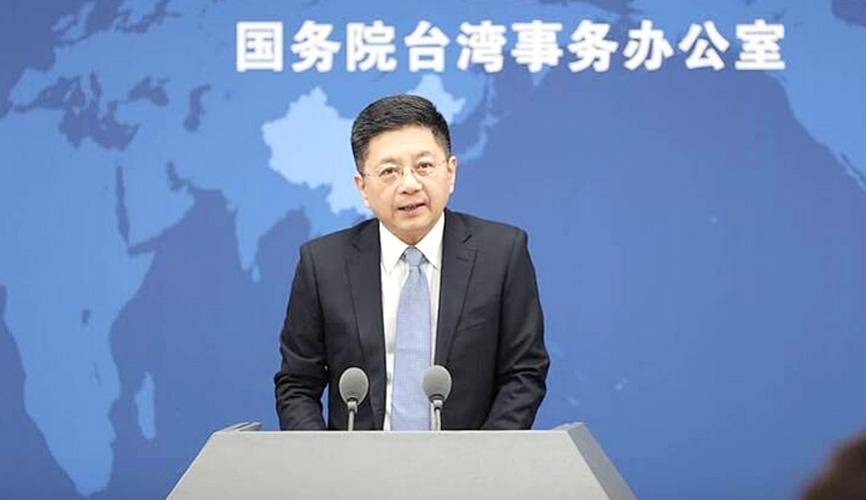China yesterday put two Taiwanese non-profit organizations and several companies on a “secessionist” blacklist as US House of Representatives Speaker Nancy Pelosi made a historic visit to Taiwan.
Pelosi landed in Taipei on Tuesday evening, despite a series of increasingly stark threats from Beijing.
China’s Taiwan Affairs Office spokesman Ma Xiaoguang (馬曉光) told a news conference yesterday that punitive measures would be initiated against the Taiwan Democracy Foundation (TDF), the International Cooperation and Development Fund (ICDF) and “diehard Taiwan secessionists.”

Taipei Times file photo
The TDF and the ICDF are affiliated with Taiwan’s Ministry of Foreign Affairs.
Ma said the funds and their alleged donors — including Speedtech Energy, Hyweb Technology, Skyla Corp and Skyeyes GPS Technology — would be banned from engaging in any transaction or cooperating with organizations, enterprises or people in China.
The TDF and the ICDF are engaged in “secessioninst [sic] activities” around the world under the “guise of democracy and development” in a bid to expand Taiwan’s “so-called international space,” he was paraphrased by China’s state-owned Global Times as saying.
Democratic Progressive Party (DPP) deputy-secretary general Lin Fei-fan (林飛帆), who also chairs the TDF, said Beijing has no say in the fund’s operations and its hasty comments are proof of its desperation.
“The TDF will not yield to China,” he said. “The public is called upon to support the foundation to show that bullying will never be accepted.”
The TDF and the ICDF are organizations that serve as conduits for Taiwan to conduct diplomacy and promote international cooperation, and Ma’s comments about the funds are not based on logic or facts, DPP Legislator Lai Jui-lung (賴瑞隆) said.
“Beijing’s bullying would achieve nothing except arouse the antipathy of Taiwanese toward China,” he said. “We urge the communist regime in China to stop before it falls into an abyss.”
Chinese Nationalist Party (KMT) Culture and Communications Committee deputy director Lin Chia-hsing (林家興) said the punitive measures would not promote the welfare of people on the two sides of the Taiwan Strait, and Chinese authorities should stop inappropriate policies that harm the relationship between Taiwan and China.
The TDF and the ICDF are bipartisan entities that represent the government and not a single party or faction, he said, adding that half of the TDF’s board were appointed by political parties, including the KMT.
“They cannot be said to be an association composed of die-hard Taiwanese secessionists and do not deserve punitive measures,” Lin added.
Meanwhile, a Skyla spokesman said the company has ever never donated to the ICDF.
While an investigation found that a former employee had made a NT$3,000 contribution to the fund’s medical charity in 2018, the check was issued from the former employee’s personal account and Skyla was not involved in any way, the spokesman said.
Speedtech Energy director Chu Yen-ting (巨彥霆) said he was prompted to contribute “a sum too petty to note” to the ICDF by a friend four or five years ago, adding that he is “pissed off” about being labeled a secessionist in Beijing.
“My company does no business in China. If China wants to call me a die-hard pro-Taiwanese independence, then I will be one,” he said.
Additional reporting by Chen Yun, Fang Wei-chieh, Hsieh Wu-hsiung and Lin Liang-sheng

The first global hotel Keys Selection by the Michelin Guide includes four hotels in Taiwan, Michelin announced yesterday. All four received the “Michelin One Key,” indicating guests are to experience a “very special stay” at any of the locations as the establishments are “a true gem with personality. Service always goes the extra mile, and the hotel provides much more than others in its price range.” Of the four hotels, three are located in Taipei and one in Taichung. In Taipei, the One Key accolades were awarded to the Capella Taipei, Kimpton Da An Taipei and Mandarin Oriental Taipei. Capella Taipei was described by

The Taichung District Court yesterday confirmed its final ruling that the marriage between teenage heir Lai (賴) and a man surnamed Hsia (夏) was legally invalid, preventing Hsia from inheriting Lai’s NT$500 million (US$16.37 million) estate. The court confirmed that Hsia chose not to appeal the civil judgement after the court handed down its ruling in June, making the decision final. In the June ruling, the court said that Lai, 18, and Hsia, 26, showed “no mutual admiration before the marriage” and that their interactions were “distant and unfamiliar.” The judge concluded that the couple lacked the “true intention of

EVA Airways today confirmed the death of a flight attendant on Saturday upon their return to Taiwan and said an internal investigation has been launched, as criticism mounted over a social media post accusing the airline of failing to offer sufficient employee protections. According to the post, the flight attendant complained of feeling sick on board a flight, but was unable to take sick leave or access medical care. The crew member allegedly did not receive assistance from the chief purser, who failed to heed their requests for medical attention or call an ambulance once the flight landed, the post said. As sick

INDUSTRY: Beijing’s latest export measures go beyond targeting the US and would likely affect any country that uses Chinese rare earths or related tech, an academic said Taiwanese industries could face significant disruption from China’s newly tightened export controls on rare earth elements, as much of Taiwan’s supply indirectly depends on Chinese materials processed in Japan, a local expert said yesterday. Kristy Hsu (徐遵慈), director of the Taiwan ASEAN Studies Center at the Chung-Hua Institution for Economic Research, said that China’s latest export measures go far beyond targeting the US and would likely affect any country that uses Chinese rare earths or related technologies. With Japan and Southeast Asian countries among those expected to be hit, Taiwan could feel the impact through its reliance on Japanese-made semi-finished products and